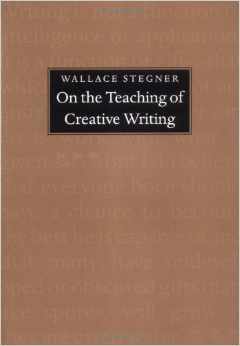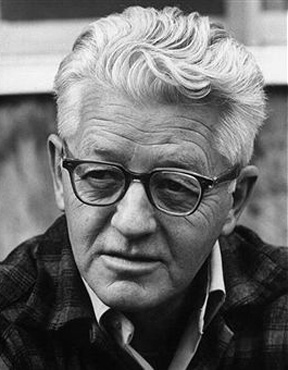 When I first began writing, I read lots of books on writing—many on the techniques of writing fiction, some on the writing life, and a few on grammar. But I didn’t read anything on teaching creative writing; that was too far beyond my ken.
When I first began writing, I read lots of books on writing—many on the techniques of writing fiction, some on the writing life, and a few on grammar. But I didn’t read anything on teaching creative writing; that was too far beyond my ken.
In the past seven years, I have drafted three novels, many essays and blog posts, some short stories, and even some poetry. I have self-published one of my novels. I have attended some writing conferences, and even taught a session at one of those conferences.
So when I saw that my library had a book by Wallace Stegner, On the Teaching of Creative Writing, a book of essays on writing and on the teaching of writing, I decided I was ready to read it. Stegner founded the creative writing program at Stanford University, where I went to law school (which has little to do with creative writing, but hey). He wrote wonderful prose himself, including the novel Angle of Repose, which won the Pulitzer Prize in 1972.
I wanted to see what Stegner could teach me at this adolescent stage of my writing career. Here is what I learned from his essays in On the Teaching of Creative Writing. Each quote is followed by the title of the essay in which the quote appears.
- On language and communication:
- “Language has been called the greatest human invention; upon it practically all human civilization is built. In spite of the exercise books and the negative approach of our schools, language stays alive . . . .” [Creative Writing]
- “When a fiction writer dissolves grammar, syntax, and logic, he is in grave danger of dissolving everything he is trying to communicate. If he cannot be restrained or directed, he must be permitted to go his way, but he had better know what he is risking.” [On the Teaching of Creative Writing]
- “Robert Frost used to say that a fiction writer should be able to tell what happened to himself as if it had happened to someone else, and what happened to someone else as if it had happened to himself. That puts the emphasis where it belongs: on the technique of communication, the persuasiveness of the fiction” [On the Teaching of Creative Writing]
- “The creative writer is compulsively concrete—that is, he is bound to the things of experience. . . . He does not deal in concepts, . . . he is concerned with people, places, actions, feelings, sensations . . . . because ideas in their conceptual state are simply not dramatic. They have to be put into the form of people and actions to achieve their proper force. One Macbeth on stage is worth a thousand essays on ambition.” [Creative Writing]
- On writing and the meaning of life:
- “The novelist and short story writer John Cheever, when asked why he wrote, did not say, ‘To show how the upper middle class lives in Connecticut.’ He said, ‘To try to make sense out of my life.’ Creative writing . . . is sure to involve some search for meaning, some element of wonder and discovery, a degree of personal involvement in the result . . . .” [Creative Writing]
- “Because [the writer] writes fiction in order to reflect or illuminate life, his materials obviously must come out of life. These materials are people, places, things—especially people. If fiction isn’t people it is nothing . . . .” [Fiction: A Lens on Life]
- “Any life will provide the material for writing, if it is attended to.” [On the Teaching of Creative Writing]
- “how do you teach people to enlarge themselves in order to enlarge their writing? . . . Largeness is a lifelong matter—sometimes a conscious goal, sometimes not. You enlarge yourself because that is the kind of individual you are. . . . If you are a grower and a writer as well, your writing should get better and larger and wiser. But how you teach that, the Lord knows.” [On the Teaching of Creative Writing]
- In looking for writing students, “what one looks for is sensibility . . . . One looks for evidence that eyes and ears are acute and active, and that there is some capacity to find words for conveying what the senses perceive and what sense perceptions do to the mind that perceives them. . . . What one looks for is accuracy, rightness, vividness. And beyond that, of course, some notion, however rudimentary, of the seriousness of good writing, some sense that literature should enhance life.” [On the Teaching of Creative Writing]
- “The meeting of writer and reader is an intimate act, and it properly takes place in private.” [The Writer’s Audience]
- “The man who publishes a book is a man with a sending set but no receiver, broadcasting messages into space without ever knowing whether they have reached any ears. . . . the writing of books is a private, not a public, art.” [The Writer’s Audience]
- “You write to satisfy yourself and the inevitabilities of the situation you have started in motion. . . . you write to satisfy yourself, but you write always in the remote awareness of a listener . . . . Nevertheless, . . . ignore him, do not write what you think he would like. Write what you like.” [To a Young Writer]
- On the difficulty of writing:
- “Summary and scene are all there is to fiction, but neither is simple.” [A Note on Technique]
- “a novel is a long, long agony. When Bill Styron described it as like setting out to walk from Vladivostok to Spain on your knees, he was not just making a phrase.” [On the Teaching of Creative Writing]
- “the working habit . . . is probably the most important habit any writer needs to have. He has to learn it for himself, but a class that acts as a deadline—a hard deadline—can help him do it.” [On the Teaching of Creative Writing]
- On why we read and write:
- “A fiction writer, in particular, has to be a jack of all knowledges. . . . So he reads, not committing reading for the sake of the information, but picking up all sorts of information in the course of reading that is done with only curiosity and interest for its motivation.” [On the Teaching of Creative Writing]
- “Some writers write, and some readers read, not to confront or examine their lives but to escape from them into a world where men are nobler and sexier, and women more beautiful, than in our nine-to-five world, and where male or female adventures, rape and murder, gang bangs and gang killings and space journeys, enliven with their fantasy our otherwise dull days.” [“Goin’ To Town”: An Object Lesson]
I encourage the writers in my audience to read Stegner’s book, On the Teaching of Creative Writing.
Writers, which of these quotes from Wallace Stegner most hits home for you?





I know I’m going to steal this one for something: “The creative writer is compulsively concrete—that is, he is bound to the things of experience. . . . He does not deal in concepts, . . . he is concerned with people, places, actions, feelings, sensations . . . . because ideas in their conceptual state are simply not dramatic. They have to be put into the form of people and actions to achieve their proper force. One Macbeth on stage is worth a thousand essays on ambition.” [Creative Writing]
Thanks, Theresa!
Luanne,
I love this quote, too. It really describes the difference between creative fiction and the factual essay-writing we learned in school. Just give Mr. Stegner credit when you steal it!
Theresa
Definitely!
What a great blog! Thank you for sharing this wisdom.
Thank you, Deborah.
“The working habit…” This is the most important advice for me. Developing the discipline, the promise to myself, following through each day and keeping the promise. I write each day because I need to and don’t feel right if I don’t. For a long time fear kept me from writing at all, now that I write, I feel a little empty if I don’t put it down on paper each day. Now the fear is my fuel.
Mark, this is true for all of us! Good comment,
Theresa
■“Summary and scene are all there is to fiction, but neither is simple.”
Boy, you can say that again!
This is great stuff Theresa, thanks!
Jill,
I’m still trying to figure this one out.
Thanks for reading,
Theresa